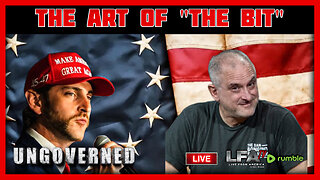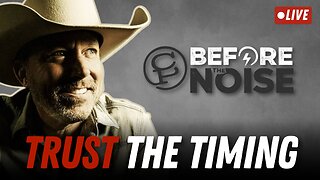Premium Only Content

Episode 3226: The Watchdogs Who Would Not Bark
www.catholic-reboot.com
Nightly Zoom Coordinates for Rosary:
Meeting ID: 865 8978 0399
Passcode: Wjjv4960!
Speak Lord for your Servant is Listening
Book Recommendation of the Day
St. Gregory the Great – Pastoral Rule (Regula Pastoralis)
• A classic handbook for bishops and priests on how to govern souls with humility, courage, and truth.
• Gregory warns against shepherds who remain silent in the face of sin:
“The shepherd who fears to rebuke the sinner is like a watchdog who cannot bark.”
• It is a direct antidote to the silence and negligence you’re addressing.
Before getting into this morning episode I want to address troubling news: Cardinal Blase Cupich, once again, has doubled down on a public endorsement that many faithful Catholics see as scandalous. When a shepherd of the Church publicly gives approval to positions or individuals contrary to Catholic teaching, it doesn’t just confuse it wounds the Mystical Body of Christ.
We are not here to sensationalize. Rather, we must evaluate these actions through the unchanging lens of Catholic Tradition, the teachings of Scripture, and the wisdom of the saints.
The Nature of Scandal
Scandal, in Catholic moral theology, is not simply something shocking. St. Thomas Aquinas defines it as “a word or action evil in itself, which occasions another’s spiritual ruin.” When a cardinal publicly supports an individual or cause contrary to the Faith, the scandal comes not only from the act itself but from the confusion it creates among the faithful.
Scripture is clear: Our Lord warns, “Whoever causes one of these little ones who believe in me to sin, it would be better for him to have a great millstone fastened around his neck and be drowned in the depth of the sea” (Matthew 18:6).
A Cardinal’s Responsibility
A cardinal is not an ordinary priest; he is one of the Pope’s principal advisors, meant to be an example to clergy and laity alike. His words carry weight far beyond a personal opinion.
When that authority is used to endorse error, the result is a corrosion of trust in the episcopacy itself.
Traditional Catholic teaching reminds us that bishops are successors of the Apostles, yet their authority is valid only insofar as it aligns with Christ and His deposit of faith. St. John Chrysostom once remarked: “The road to hell is paved with the skulls of bishops.” This was not cynicism, but a sober recognition of the immense responsibility attached to apostolic office.
Silence of the Shepherds
Why is this so damaging today? Because silence often follows. Too few bishops speak against one another when scandal arises. Instead of fraternal correction, we often witness an unspoken pact of mutual tolerance.
Contrast this with the example of St. Paul, who publicly rebuked St. Peter at Antioch when his conduct risked compromising the truth of the Gospel (Galatians 2:11–14). If Peter himself could be corrected for scandalous behavior, how much more today’s leaders when they compromise truth for acceptance?
The Faithful Response
What then must Catholics do?
1. Pray for our shepherds. St. Catherine of Siena reminded us: “Even if the shepherds are devils incarnate, we must pray for them and love them for the sake of Christ.”
2. Cling to Tradition. Our refuge is in the timeless teaching of the Church, the Mass of the Ages, the catechism, and the witness of the saints.
3. Reject confusion. We are not bound to follow a bishop or cardinal into error. As Pope St. Pius X said: “Far, far from the clergy be the love of novelty.”
4. Bear witness. When scandal spreads, the laity have a duty to defend the truth charitably but firmly.
The crisis surrounding Cardinal Cupich is not isolated it reflects a broader struggle in the Church between fidelity and compromise, between the timeless Gospel and the spirit of the age.
Our hope is not in personalities or prelates, but in Christ the King, who promised: “The gates of hell shall not prevail against the Church.” (Matthew 16:18).
Introduction
“You cannot oppose an ideology with an opinion, or a philosophy of life with appeasing compromises. The mere fact that you give your right arm to a bear is no guarantee that he will not take your left.” Archbishop Fulton Sheen
The Watchdogs Who Would Not Bark
In every age of the Church, the faithful have faced moments of confusion, when shepherds have faltered and scandal has shaken confidence in the hierarchy. Yet the saints and Fathers of the Church have always reminded us that Christ is the true Head of His Mystical Body, and His truth does not change.
This episode is not about personalities or modern controversies. It is about learning from the Fathers of the Church how to confront scandal with clarity, fidelity, and hope. The wisdom of men like St. Augustine, St. John Chrysostom, and St. Gregory the Great still speaks directly into our moment of trial.
Segment 1: The Nature of Scandal
Scandal, in Catholic teaching, is not merely something shocking or offensive. It is a wound to souls.
• St. Thomas Aquinas defined it clearly: “Scandal is a word or action evil in itself, which occasions another’s spiritual ruin.”
• Our Lord Himself gave the sternest warning: “Whoever causes one of these little ones who believe in me to sin, it would be better for him to have a great millstone fastened around his neck and be drowned in the depth of the sea” (Matthew 18:6).
The Fathers understood that scandal from within the Church is especially deadly. St. Cyprian of Carthage wrote:
“The Church is rent by those whom it has made its own; it suffers wounds from those whom it has begotten.”
Scandal confuses the faithful, erodes trust, and tempts souls into error. This is why the Fathers treated it as a matter not of gossip but of eternal consequence.
Segment 2: Responsibility of the Shepherds
The Fathers of the Church never romanticized the episcopacy. They saw it as an office of immense responsibility, where failure carried grave consequences.
• St. John Chrysostom famously said: “The road to hell is paved with the skulls of bishops.” This was not cynicism but a sober reminder that pastors are judged more strictly (cf. James 3:1).
• St. Gregory the Great, in his Pastoral Rule, warned that pastors who seek human approval instead of divine truth lead their flock into ruin:
“The shepherd who fears to rebuke the sinner is like a watchdog who cannot bark.”
The Fathers knew that episcopal authority is real, but it is bound to fidelity. St. Augustine taught:
“We believe the bishops, not because they are bishops, but because they proclaim what the Church has always taught.”
The authority of shepherds is real only when exercised in harmony with Christ and His deposit of faith.
Segment 3: Silence of the Shepherds
One of the deepest wounds in the Church comes not only from scandalous actions, but from silence. Too often, shepherds fail to correct one another, leaving the faithful confused.
The Fathers give us a biblical example: St. Paul publicly rebuked St. Peter at Antioch (Galatians 2:11–14). Paul did not attack Peter’s office, but he corrected his conduct, which risked compromising the truth of the Gospel.
• St. Jerome, commenting on this passage, said:
“Peter was reproved by Paul so that the leaders of the Church might not think themselves above correction.”
• St. Augustine agreed, noting that fraternal correction, even among bishops, is an act of charity, not rebellion.
The silence of shepherds, when faced with error, is not charity but negligence. The Fathers remind us: truth must be defended, even when it is uncomfortable.
Segment 4: The Faithful Response
What then are the faithful to do in times of scandal or silence? The Fathers and saints provide a roadmap:
1. Pray for Our Shepherds
o St. Catherine of Siena, echoing the Fathers, wrote:
“Even if the shepherds are devils incarnate, we must pray for them and love them for the sake of Christ.”
Prayer is the first duty, for God alone can change hearts.
2. Cling to Tradition
o St. Vincent of Lérins taught the famous rule:
“Hold fast to that which has been believed everywhere, always, and by all.”
Tradition is the anchor in times of confusion.
3. Reject Confusion
o St. Athanasius, who stood almost alone against the Arian heresy, said:
“Even if Catholics faithful to Tradition are reduced to a handful, they are the true Church.”
The faithful are not bound to follow error, even when promoted by those in authority.
4. Bear Witness with Charity
o St. Basil the Great urged:
“It is not enough to avoid error ourselves; we must also resist it openly for the sake of others.”
The Fathers call us not to despair, but to fidelity.
Conclusion: Our Hope in Christ
The Fathers of the Church teach us that scandal is real, silence is harmful, and fidelity is demanded. But they also remind us that the Church does not stand on human strength. Our hope is not in bishops or cardinals, but in Christ the King, who promised: “The gates of hell shall not prevail against the Church.” (Matthew 16:18).
In times of scandal, we must pray, remain faithful to Tradition, and bear witness. Like the Desert Fathers and the great bishops of old, we must keep our eyes fixed on Christ, who alone is our Shepherd and Judge.
Epistle – Ecclesiasticus 51:1–8, 12
"I will give glory to Thee, O Lord the King, and I will praise Thee, O God my Savior... I will give thanks to Thee, O Lord the King, and I will praise Thee, O God my Savior. For Thou hast been my helper and hast delivered me from destruction, and from the snare of an unjust tongue, and from the lips of them that forged lies... And I praised the Lord even unto death, and I declared that He is the Lord of life."
Reflection on the Epistle
This passage is a song of thanksgiving from a soul rescued by God from danger, slander, and destruction. It reminds us that deliverance belongs not to human strength but to God’s saving power.
For St. Cyprian, this passage is profoundly fitting. Once a practitioner of the dark arts, he sought to corrupt the purity of Justina, but was instead conquered by her prayers and the grace of God. Converted, he gave thanks to Christ who delivered him from the power of demons. Justina herself, in her fidelity, was preserved from evil and became a witness to the power of divine help.
For us, this reading calls to mind the importance of gratitude. Too often we forget to thank God for the daily deliverances seen and unseen that preserve us from sin and harm. Traditional Catholic spirituality insists that thanksgiving is at the heart of prayer, especially in the Holy Sacrifice of the Mass, which itself means “Eucharist,” or thanksgiving.
Gospel – Matthew 25:1–13
"Then shall the kingdom of heaven be like to ten virgins, who taking their lamps went out to meet the bridegroom... But at midnight there was a cry made: Behold the bridegroom cometh, go ye forth to meet him. Then all those virgins arose, and trimmed their lamps. And the foolish said to the wise: Give us of your oil, for our lamps are gone out. But the wise answered... Watch ye therefore, because you know not the day nor the hour."
Reflection on the Gospel
The parable of the ten virgins is a call to vigilance. Half are wise, keeping their lamps filled with oil symbols of grace, virtue, and perseverance. The others are foolish, neglecting preparation, and when the Bridegroom arrives, they find themselves shut out of the wedding feast.
This Gospel is particularly sobering for us today. Many Catholics presume upon God’s mercy without living in a state of grace, neglecting confession, prayer, and vigilance. But Christ warns: “You know not the day nor the hour.”
Sts. Cyprian and Justina remind us of this vigilance. Justina kept her lamp burning with the oil of purity and prayer, resisting temptation. Cyprian, once foolish in sin, became wise through conversion, and at last gave his life in martyrdom ready for the Bridegroom’s call.
For us, the message is clear: do not delay conversion. Keep your lamp filled through the sacraments, prayer, fasting, and good works. Be watchful, for Christ will come at the hour you least expect.
________________________________________
Feast of Sts. Cyprian and Justina
According to tradition, St. Cyprian was a magician and pagan priest in Antioch who tried to corrupt the young virgin Justina through sorcery. Her prayers overcame his efforts, and the demons themselves confessed their powerlessness against the sign of the Cross. Converted, Cyprian renounced the occult, was baptized, and became a bishop. Both he and Justina were martyred under Diocletian.
Their feast is a powerful reminder that Christ’s grace conquers sin, idolatry, and even the darkest forces of the enemy. They stand as witnesses to the power of prayer, purity, and conversion.
Application for Today
• Give thanks daily: Like the author of Ecclesiasticus, cultivate a heart of gratitude for God’s deliverance.
• Stay vigilant: Keep your spiritual lamp filled through confession, prayer, and devotion.
• Reject the powers of darkness: Like Cyprian, renounce all superstition, occult practices, and worldly compromise.
• Imitate purity and fidelity: Like Justina, remain steadfast in prayer, especially amid temptation and trial.
Conclusionary Prayer
O God, who didst gloriously crown Sts. Cyprian and Justina with martyrdom after converting them into faithful witnesses of Thy truth, grant us, through their intercession, to be ever thankful for Thy deliverance and ever vigilant in preparing for the coming of Thy Son. May our lamps be filled with the oil of grace, that when the Bridegroom calls, we may be ready to enter into His eternal feast.
Sts. Cyprian and Justina, pray for us.
Sacred Heart of Jesus, have mercy on us.
Immaculate Heart of Mary, intercede for us.
-
 LIVE
LIVE
Dear America
2 hours agoGUEST: ERIC TRUMP! Dems ADMIT to Shutdown! + Feds Move to Tennessee!!
2,488 watching -
 LIVE
LIVE
Matt Kohrs
11 hours agoROCKETING TO NEW HIGHS 🚀🚀🚀 (Stock Market Open) || Live Trading Futures & Options
812 watching -
 LIVE
LIVE
Wendy Bell Radio
5 hours agoDemocrats Are Getting CLOBBERED
7,854 watching -
 LIVE
LIVE
LFA TV
5 hours agoLIVE & BREAKING NEWS! | THURSDAY 10/2/25
3,468 watching -
 UPCOMING
UPCOMING
Chad Prather
14 hours agoWhen God Delays: Trusting Jesus in the Waiting Room of Life
24.7K6 -

The Chris Salcedo Show
13 hours ago $6.91 earnedThe Democrat's Schumer Shutdown
19K2 -
 30:32
30:32
Game On!
18 hours ago $2.90 earned20,000 Rumble Followers! Thursday Night Football 49ers vs Rams Preview!
26.5K4 -
 1:26
1:26
WildCreatures
14 days ago $3.26 earnedCow fearlessly grazes in crocodile-infested wetland
29.3K5 -
 29:54
29:54
DeVory Darkins
1 day ago $16.82 earnedHegseth drops explosive speech as Democrats painfully meltdown over Trump truth social post
76.3K79 -
 19:39
19:39
James Klüg
1 day agoAnti-Trump Protesters Threaten To Pepper Spray Me For Trying To Have Conversations
41.3K29